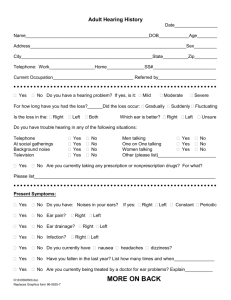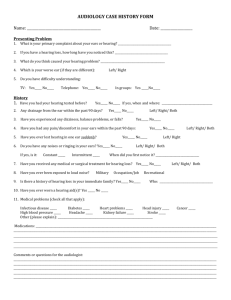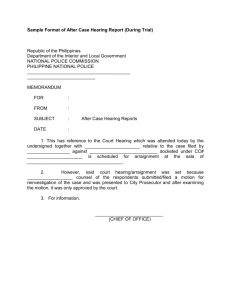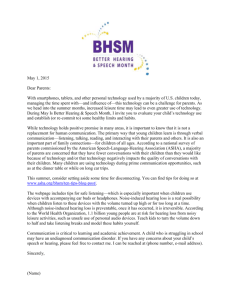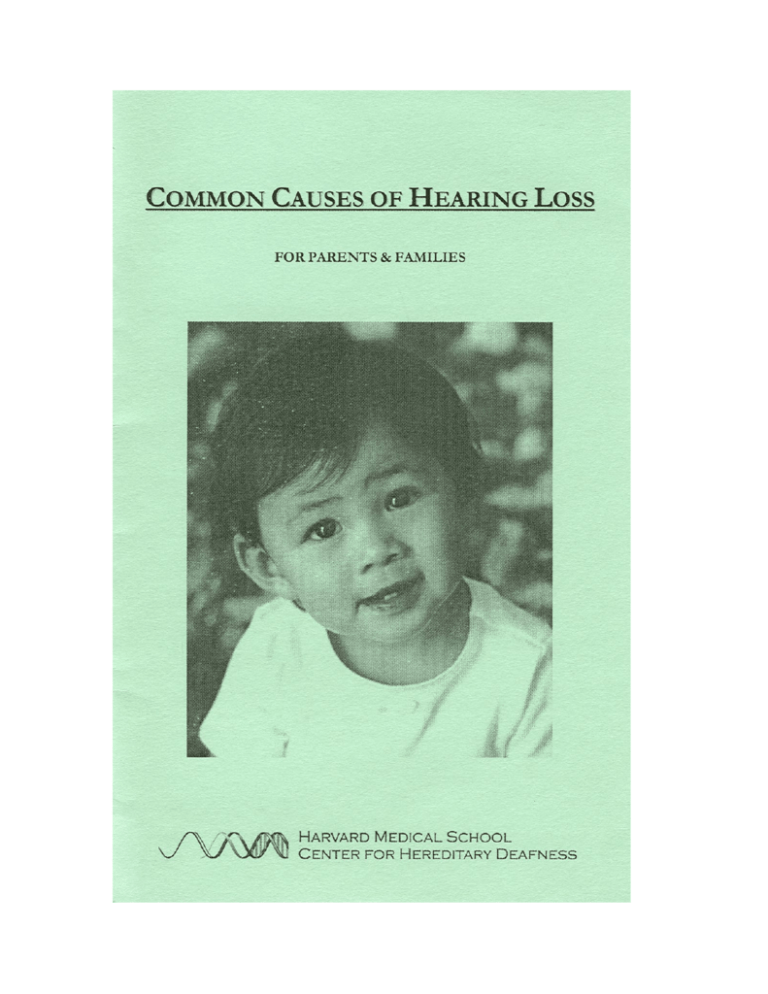
When your child is diagnosed with a hearing loss, it may be very
overwhelming. This may be a difficult time for you and your family.
However, gaining a greater knowledge in this area is crucial in helping
with your child’s needs. This handbook is aimed at helping parents
and families to understand better various types and causes of hearing
loss.
it may result in a conductive hearing loss (sometimes called
“mechanical hearing loss”). If, on the other hand, something is not
working in the
•
•
•
cochlea
auditory nerve or
brain
it more commonly results in a sensorineural hearing loss (also called
“nerve hearing loss”). When someone has both sensorineural and
conductive hearing losses, it is called a mixed hearing loss.
ABOUT HEARING LOSS
Our ears contain many parts, all of which need to work properly for us
to hear sounds.
DURATION OF HEARING LOSS
Depending on the cause, hearing loss may be temporary or permanent.
Temporary hearing losses are almost always conductive and are far
more common than permanent hearing losses. Permanent hearing
losses are usually sensorineural, but may also be conductive. A chart
below demonstrates this relationship and outlines the causes.
Temporary Hearing Loss
♦ More common
♦ Mostly conductive
Middle Ear Fluid &
Other Causes
HEARING LOSS
Permanent Hearing Loss
♦ Less common
♦ Mostly sensorineural
Genetic
The type of hearing loss that occurs depends on what part of the ear is
not working properly. For example, if there is something not working
in the
•
•
ear canal
eardrum
•
•
Structural
Problems
Infections
Drug
Related
Physical
Traumas
middle ear bones or
middle ear space (e.g. fluid)
COMMON CAUSES OF HEARING LOSS 1
FOR PARENTS & FAMILIES
2 COMMON CAUSES OF HEARING LOSS
FOR PARENTS & FAMILIES
WHAT CAUSES TEMPORARY HEARING LOSS?
Genetics
There are several causes of temporary hearing loss. The most common
cause is fluid in the middle ear (i.e. due to ear infections). Other
causes may include:
•
•
•
Eardrum perforation (when there is a hole in the eardrum from
a bad ear infection, or ear trauma)
Narrowing of the ear canal due to surgery or disease
Excessive ear wax that plugs the ear canal
DID
YOU
KNOW?
Poking objects too deeply into the ear canal (Q-tips,
pencils, food, buttons, pins, etc) can cause hearing loss.
It is the most common ear injury in toddlers.
Although there are many reasons why permanent hearing loss may
occur, genetics is the most common. It accounts for over half of all
cases of hearing loss in infants. Saying that hearing loss is “genetic”
means that there is a change in a gene.
•
•
•
•
We have the same set of genes in every cell of our body
Genes tell our cells how to function
When a change in a gene occurs it is called a “mutation”
A mutation can stop the gene from working properly
DID
YOU
KNOW?
While there are some families that have hearing loss
in many generations, most people with genetic
hearing loss do not have family members with
hearing loss.
WHAT CAUSES PERMANENT HEARING LOSS?
Syndromic vs. Non-syndromic Hearing Loss
Permanent hearing losses are less common than temporary hearing
losses. There are many causes of permanent hearing losses. These
include genetic, infectious, drug-related, physical trauma and structural
causes. A rough distribution of these is seen below:
DrugRelated
Infections
Unknown
Structural
Problems
Physical
Traumas
There are two types of hearing loss caused by genetics. About 30% of
people with a genetic type of hearing loss have what is called a
syndromic hearing loss. Syndromic hearing loss means that there are
other health problems in addition to hearing loss. Some examples
include:
NAME OF SYNDROME
OTHER FEATURES (Besides Hearing Loss)
Alport
Pendred
Usher
Jervell and Lange-Nielsen
Kidney problems
Thyroid gland enlargement
Vision impairment
Heart problems
The other 70% of genetic hearing loss is called non syndromic
hearing loss. In this case, the person only has hearing loss.
Genetics
COMMON CAUSES OF HEARING LOSS 3
FOR PARENTS & FAMILIES
4 COMMON CAUSES OF HEARING LOSS
FOR PARENTS & FAMILIES
After Birth
Genetic testing may help determine if the hearing loss is genetic. This
information may allow better treatment and management of the hearing
loss, and predict the chances that future children will have hearing loss.
To learn more about genetic causes of hearing loss, you may download
a free booklet at http://hearing.harvard.edu.
• Ototoxic drugs (e.g. aminoglycoside antibiotics, diuretics,
cisplatin)
Physical Trauma
Infections
The ear is a delicate structure and can be easily damaged in a number
of ways, such as:
New vaccines have prevented some hearing loss caused by infections.
However, other infectious causes still exist. Some examples include:
During Pregnancy
•
•
•
Infections caused by viruses (Cytomegalovirus [CMV], herpes,
rubella)
Syphilis
Toxoplasmosis (may be associated with consumption of food
or water contaminated with animal feces, or of raw or
undercooked meat)
• Head injuries (skull fractures or concussions)
• Exposure to loud noise (either a single blast or many
exposures to loud noises)
Structural Problems of the Ear
A person can be born with an ear that is not formed normally. This
could affect the outer, middle or the inner ear. Examples include:
•
•
After Birth
•
•
•
Infections caused by bacteria (bacterial meningitis, syphilis)
Infections caused by viruses (measles, mumps)
Unknown Causes
Sometimes the cause of hearing loss cannot be identified. This may be
because there are no available tests to find the cause. For instance,
there are no tests for many genetic causes of hearing loss.
Drugs
Drugs and other chemicals can also cause hearing loss. Some drugs
can affect the fetus, while others are harmful after birth. Some of these
include:
During Pregnancy
•
•
Stenosis (narrowing of the ear canal)
Absence or malformation of the outer ear, ear canal, ear drum,
ear bones
Inner ear malformations (e.g. enlarged vestibular aqueduct)
Alcohol
Medications (e.g. Accutane®, Dilantin®, chemotherapy)
COMMON CAUSES OF HEARING LOSS 5
FOR PARENTS & FAMILIES
In addition, there are other causes of hearing loss that we do not yet
understand. For example, a higher incidence of hearing loss has been
seen in newborn babies with many different risk factors such as.:
•
•
•
•
Lengthy stay in the Neonatal Intensive Care Unit (NICU)
Very premature birth
High levels of bilirubin
Low oxygen levels
6 COMMON CAUSES OF HEARING LOSS
FOR PARENTS & FAMILIES
The relationship between many of these risk factors and hearing loss is
unclear.
ADDITIONAL RESOURCES
♦ American Academy of Otolaryngology Head and Neck Surgery
Click on Public and Parents, and then on ENT Health Info to view
information on ear infections, ear function, plastic surgery of the ear,
cochlear implants and other links.
www.entnet.org
IN SUMMARY
Finding the cause of hearing loss is often not an easy task. Making an
accurate diagnosis and finding a way to manage the hearing loss
requires a combination of
•
•
•
•
a physical exam
family history
clinical tests (such as genetic tests, MRI, EKG, CT scans, etc.)
ongoing hearing tests with an audiologist
Sometimes, even with all exams, the cause of hearing loss may remain
unknown. However, it is best if hearing loss is identified early. It is
also important that help for the hearing loss begin as early as possible.
Help can include communication therapy, parent support and hearing
devices such as hearing aids and cochlear implants. For help your
child should be enrolled in an early intervention program. This is true
even if the cause is still being examined. This gives a child with
hearing loss the best chance at language development, social
interactions and education.
♦ Boys Town National Research Hospital
Information on newborn hearing screening, hearing testing, high risk
factors for hearing loss, genetic information on hearing loss and hearing
aids. Includes www.babyhearing.org.
www.boystownhospital.org
♦ Harvard Medical School Center for Hereditary Deafness
Information on genetic forms of hearing loss, genetic testing, and a gene
mutation database.
http://hearing.harvard.edu
♦ Laboratory for Molecular Medicine at HPCGG
A clinical laboratory offering the most comprehensive genetic testing for
hearing loss. The lab is located within the Harvard Medical SchoolPartners Healthcare System Center for Genetics and Genomics.
http://www.hpcgg.org/lmm
♦ National Institute on Deafness and Other Communication Disorders
Information on disorders associated with hearing loss, cochlear implants,
ear infections, hearing aids, American Sign Language, noise-induced
hearing loss, tinnitus, and resources for educators.
http://www.nidcd.nih.gov
♦
Parents Guide to Hearing Loss
A booklet with information on communication with your child, hearing
tests, hearing devices, as well as programs for children with hearing loss.
http://medhome.med.utah.edu/file.cfm?file_id=190&
♦ Raising Deaf Kids
Information on learning and communicating with hearing loss, general
information on hearing loss and other links.
www.raisingdeafkids.org
FOR ADDITIONAL RESOURCES PLEASE VISIT OUR WEBSITE:
http://hearing.harvard.edu/resources.htm
COMMON CAUSES OF HEARING LOSS 7
FOR PARENTS & FAMILIES
8 COMMON CAUSES OF HEARING LOSS
FOR PARENTS & FAMILIES
Copyright © 2004 by Harvard Medical School Center for Hereditary Deafness
All rights reserved. This booklet is protected by copyright.



